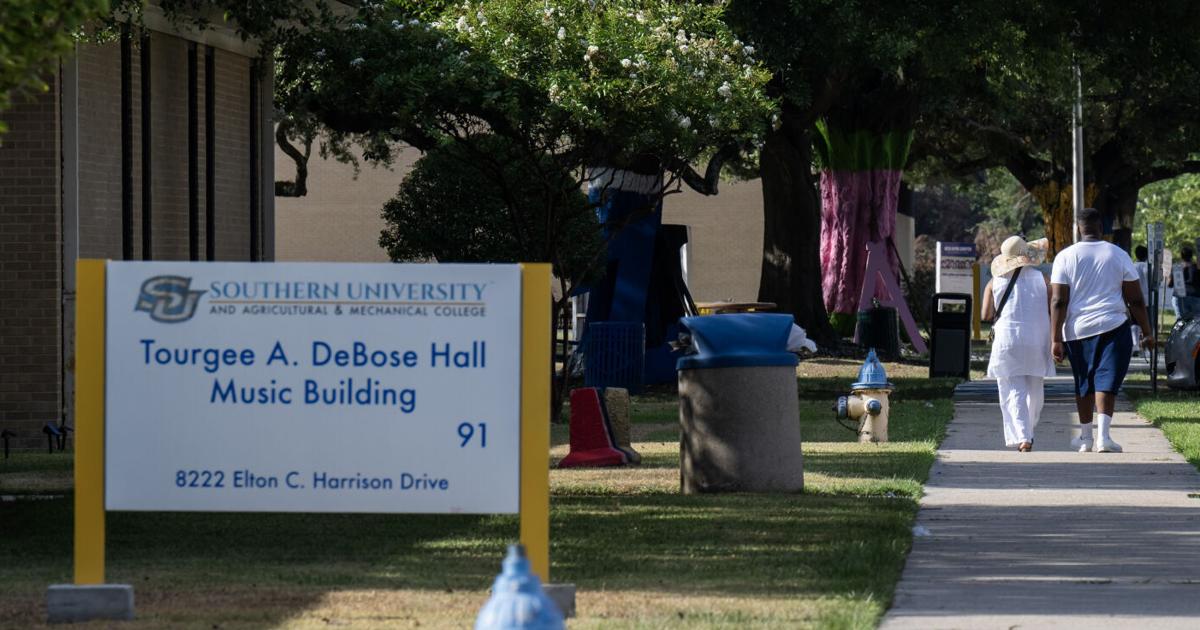Southern University has been funded inequitably, feds say | Education

Citing longstanding funding inequities between Southern University and LSU in Baton Rouge, the federal government on Monday urged state officials to restore $1.1 billion it says Southern has lost over the past three decades, a move likely to hearten advocates of historically Black colleges and universities.
The federal Departments of Education and Agriculture said Monday that Southern could have spent that money on student services and infrastructure. Federal officials urged Gov. John Bel Edwards to address the shortfall through the state’s budget process, and suggested that Louisiana could rectify the inequity over several budget years, without cutting funding to LSU. Edwards is term-limited and due to leave office in January.
“I am continually inspired by all that HBCUs have achieved despite having to punch above their weight,” U.S. Education Secretary Miguel Cardona said in a statement. “Our HBCUs graduate a huge share of our nation’s Black educators, doctors, engineers, judges and lawyers. … The Biden-Harris Administration is proud to have made record investments in our HBCUs, but to compete in the 21st century we need state leaders to step up and live up to their legally required obligations to our historically Black land-grant institutions.”
Since their inception in the 19th century, historically Black land-grant universities have faced huge funding disparities compared to their historically White peer institutions. Monday’s letter was notable in part because advocates for HBCUs have long said the federal government looks the other way as legislatures and governors don’t do enough to rectify those inequities.
Edwards has championed closing funding gaps between Southern and historically White land grant colleges, telling the Louisiana Illuminator in an August interview that doing so became a priority after former Gov. Bobby Jindal made debilitating cuts to higher education.
In a statement, Edwards’ chief budget architect, Commissioner of Administration Jay Dardenne, said the administration received the feds’ letter and plans to hold meetings with Cardona and USDA Secretary Thomas Vilsack to discuss their findings.
Edwards’ administration has “consistently” provided the federal funding match requirement for Southern, Dardenne said. Dardenne questioned the feds’ conclusion that Southern had been underfunded to the tune of $1.1 billion, saying it is “unclear where the number comes from or what it is based on.”
“Under Gov. John Bel Edwards’ leadership, historic investments have been made to higher education across the board including with the most recent budget that passed this year,” Dardenne added. “In addition, there has been a sustained commitment to addressing serious inequities in this and many other important areas.”
The funding disparity between historically Black and historically White land grant institutions traces back more than a century.
The first group of land-grant universities in the U.S. was established in 1862 under the First Morrill Act. Signed by Abraham Lincoln, that law bestowed federal lands upon states so the land could be sold to generate money for the colleges.
Under the Second Morrill Act of 1890, states could choose to open a second land-grant university specifically for Black students. They were required to give the same amount of state cash to the new schools as they gave to those created 28 years earlier. The older group of land-grant institutions has generally served more White students because most of them did not admit Black students until the Civil Rights Movement.
When the federal government gives Black land-grant universities money, states have to match that cash dollar-for-dollar. If they don’t, universities risk forfeiting the money altogether.
But advocates say that for the 1890 institutions, the required match has been the ceiling instead of the floor, leading the 1862 schools to receive funding at higher ratios. That’s partly because federal law lets states opt out of the match requirement for 1890 institutions and only contribute half in matching funds.
That means Southern has not been able to advance in ways on par with LSU, Louisiana’s original 1862 land-grant institution, the feds wrote in their letter.
State Commissioner of Higher Education Kim Reed agreed Monday that Edwards’ administration has worked to close the funding gap. “To date, the Governor and legislature have supported our requests, increasing higher education funding and financial aid, as well as providing the state funding for the Southern University Agricultural Center’s federal match and to stabilize SUNO,” Reed said. “However, these investments, though historic in size, do not erase decades of budget cuts.
Versions of the letter were also sent to the governors of Alabama, Arkansas, Florida, Georgia, Kentucky, Maryland, Mississippi, Missouri, North Carolina, Oklahoma, South Carolina, Tennessee, Texas, Virginia and West Virginia.
Historically black colleges in those states missed out on a total of $12 billion due to disparate funding, according to the feds’ analysis of National Center for Education Statistics data from the Integrated Postsecondary Education Survey.
Of the HBCUs in other states, only four were projected by the analysis to have missed out on more money than Southern. Florida Agricultural and Mechanical University lost $1.9 billion; Tennessee State University lost $2.1 billion; Prairie View A&M University in Texas lost $1.135 billion; and North Carolina A&T State University lost $2 billion, according to letters to those states’ governors.
A spokesperson for Southern University and did not immediately return a request for comment.




